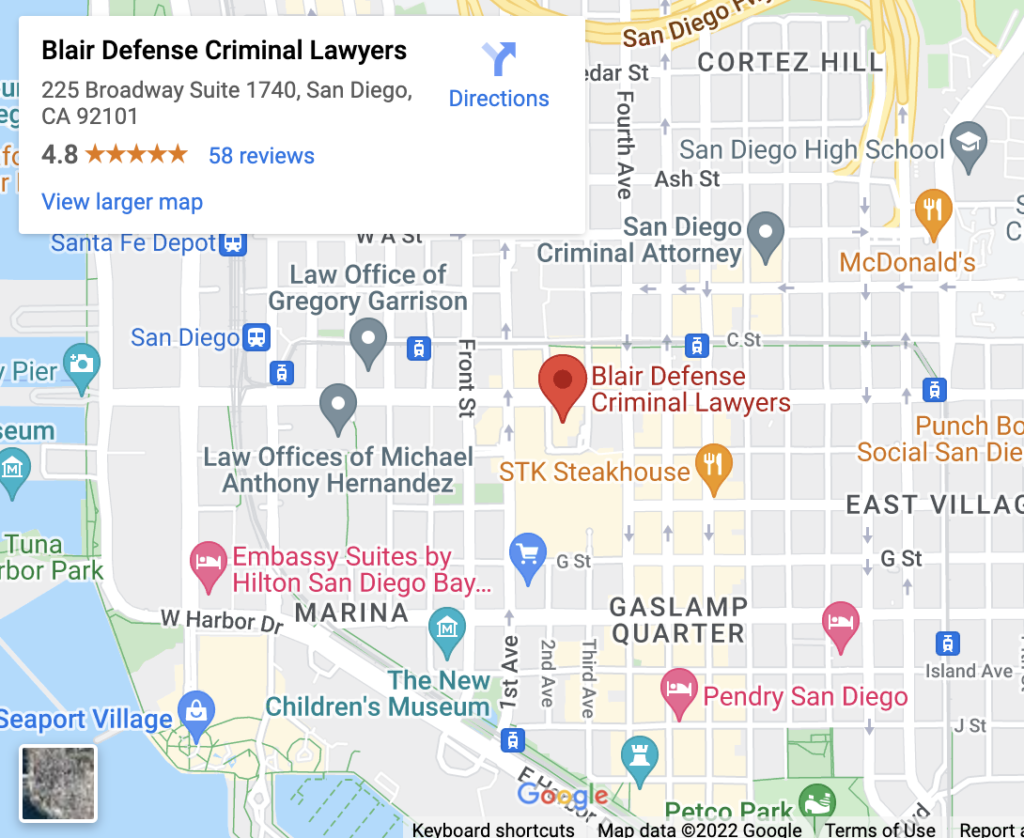
Have you been served with a restraining order in San Diego, CA? Some types of restraining orders in California can severely limit your freedom going forward. However, there could still be time for you to retain the rights the order seeks to inhibit. Blair Defense Criminal Lawyers is here to protect your interests and explain your legal options.
We’re some of the most well-respected San Diego restraining order attorneys in the area. Our lead attorney, Peter Blair, has been listed on the Top 40 Under 40 list by The National Trial Lawyers on three separate occasions. In addition, he currently holds a perfect 10.0 rating on Avvo and was named amongst America’s Top 100 Criminal Defense Attorneys list in 2020 as well.
For more information about our criminal defense law firm or to begin setting up an attorney-client relationship, call today at (619) 357-4977 or contact our San Diego law firm online. We handle a wide range of cases, including San Diego drug transportation, forgery, serious violent crimes, San Diego shoplifting, and other serious charges.
Table of Contents
How Blair Defense Criminal Lawyers Can Help With a Restraining Order in San Diego

Restraining orders in California can take many forms, some of them much more restrictive than others. Depending on the nature of your situation, you may have options available to you that could prevent the order from taking hold permanently. In some cases, it might be possible to have the order terminated altogether.
Blair Defense Criminal Lawyers can help defend your rights from the very start. Our experienced criminal lawyer in San Diego has been defending clients for over a decade; we know what it takes to fight back against any type of criminal charge or proceeding. When you hire us to represent you, we’ll assist by:
- Keeping you apprised of your legal options at all times as your case moves forward
- Doing everything in our power to have your restraining order terminated or modified in your favor
- Investigating your case internally to uncover any exculpatory evidence and the merits of the restraining order against you
- Bringing your case to further court proceedings if need be
Contact our law office in San Diego, California, today to get started. We offer a free initial consultation to review your case and provide legal advice.
Restraining Order Law in California
Restraining orders, or protective orders as they are sometimes referred to, are meant to protect one person from another in some form or fashion. The “restrained person” is the person who is the subject of the order, and the “protected person” is the person who is seeking the order.
In California, there are many different types of restraining orders, some more restrictive than others. Some merely limit the physical distance a person must maintain from another, but others can prevent contact entirely. Some are only temporary, while others are permanent.
Kinds of Restraining Orders
There are four types of restraining orders that a person may seek:
- Domestic Violence Restraining Orders
- Elder or Dependent Adult Restraining Orders
- Civil Harassment Restraining Orders
- Workplace Violence Restraining Orders
These orders vary depending on the context of the situation. A workplace violence restraining order may be sought by an employer to protect an employee, for instance. And a domestic violence restraining order seeks to protect someone from another person close to them (family member, spouse, to name a few examples).
Severity of Restraining Orders
Another way to categorize restraining orders is by their seriousness:
- Temporary Restraining Orders (TROs)
- Emergency Protective Orders
- Permanent Restraining Orders
TROs may be sought while a criminal case is still pending and can last until the case has been resolved. Depending on how the case plays out, they may also convert to a permanent restraining order. TROs may also be issued ex parte.
An emergency protective order is usually sought by someone who wants a permanent restraining order but who feels their safety is immediately threatened. These orders generally only last seven days and usually are found in the domestic violence context.
Permanent restraining orders do not actually last forever, as the name suggests; they last a maximum of five years. These orders are generally issued at the conclusion of proceedings regarding a TRO or emergency protective order.
The Violation of a Restraining Order
Violating a restraining order is covered under Section 273.6 PC of the California Penal Code. This statute makes it illegal to fail to comply with the terms and conditions of a restraining order. The prosecution must prove four legal elements beyond a reasonable doubt to convict you of violating a restraining order. These elements are:
- The restraining order was lawfully issued
- The order was violated intentionally
- The demands of the order were reasonable to follow
- The terms and conditions of the order were made apparent to you
If reasonable doubt can be cast on just one of these elements, your charges could be dropped. Having an experienced San Diego criminal defense lawyer to represent you is your best chance at achieving a favorable outcome.
Service of Process
The restrained person must generally be served with the restraining order for it to take effect legally. This means the person must receive the paperwork regarding the order, and they must receive it in person rather than by mail or other means. Usually, this is carried out by a professional process server or law enforcement. The paperwork will also generally contain the court hearing date on the matter.
What Penalties Can Result From Violating a San Diego Restraining Order?
The penalties that may result from violating a restraining order charge in San Diego vary depending on the circumstances. The penalties for a first violation, generally charged as a misdemeanor, include jail time or probation, fines, restitution, and counseling. Your criminal history could play a role in the penalties that are assessed, as could the nature and degree of the violation.
Subsequent violations within one year of the initial violation can result in further charges, including felony charges. If you’re convicted of a felony violation, the prison sentence may be up to three years or more. The exact penalty levied will depend on all of the circumstances, however.
There are other consequences to these charges beyond those directly enforced by the court, such as:
- Inability to legally possess a firearm
- Immigration issues, if applicable
- Trouble with finding housing or employment
These other consequences more commonly appear after a felony conviction, but the firearm restriction applies to anyone that has a restraining order against them. The others may apply to some degree for a misdemeanor conviction, too, however.
What Defenses Can I Raise Against Violating a Restraining Order Charges in San Diego, CA?
Fortunately, many possible defenses are available to you if you’ve been charged with violating a restraining order in San Diego. These include, but are not limited to:
- You did not intend to violate the order
- The order was not reasonable to comply with
- You were not legally made aware of the order
- Your constitutional rights were violated, for instance, a violation of your Fourth Amendment rights via an illegal search
Our lawyers will thoroughly investigate your case and the merits of the prosecution’s evidence against you when you hire us to represent you.
Schedule a Free Case Review With an Experienced San Diego Restraining Order Lawyer
If you’ve been served with a restraining order or have been charged with violating a restraining order, it’s not too late to begin mounting your defense. The experienced San Diego restraining order lawyers with Blair Defense Criminal Lawyers can begin fighting for your rights immediately.
Contact us today to schedule your free, no-pressure consultation.
Visit Our Criminal Defense Law Office in San Diego, CA
Blair Defense Criminal Lawyers
225 Broadway Suite 1740
San Diego, CA 92101
(619) 357-4977
Our criminal defense law firm in San Diego, CA also provides:
- Aiding and Abetting Lawyer in San Diego, CA
- Assault Defense Lawyers in San Diego, CA
- Battery Defense Attorneys in San Diego, CA
- Drug Crime Defense Attorney in San Diego, CA
- DUI Defense Attorney in San Diego, CA
- Domestic Violence Lawyers in San Diego, CA
- Federal Crimes Lawyer in San Diego, CA
- Fraud and Embezzlement Lawyer in San Diego, CA
- Gang Allegations Attorney in San Diego, CA
- Homicide Attorneys in San Diego, CA
- Insurance Fraud Attorneys in San Diego, CA
- Juvenile Criminal Defense Lawyer in San Diego, CA
- Money Laundering Defense Attorney in San Diego, CA
- Murder and Manslaughter Lawyer in San Diego, CA
- Probation Violation Attorney in San Diego, CA
- Public Intoxication Lawyer in San Diego, CA
- Robbery Lawyers in San Diego, CA
- Serious Violent Crimes Lawyer in San Diego, CA
- Sex Crimes Attorney in San Diego, CA
- Theft Crimes Lawyer in San Diego, CA
- Vandalism Attorney in San Diego, CA
- Weapons Charges Lawyers in San Diego, CA
- White Collar Crimes in San Diego, CA


